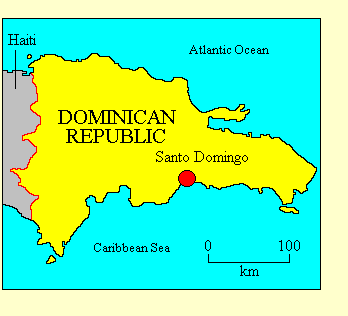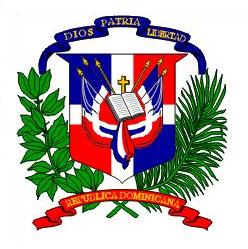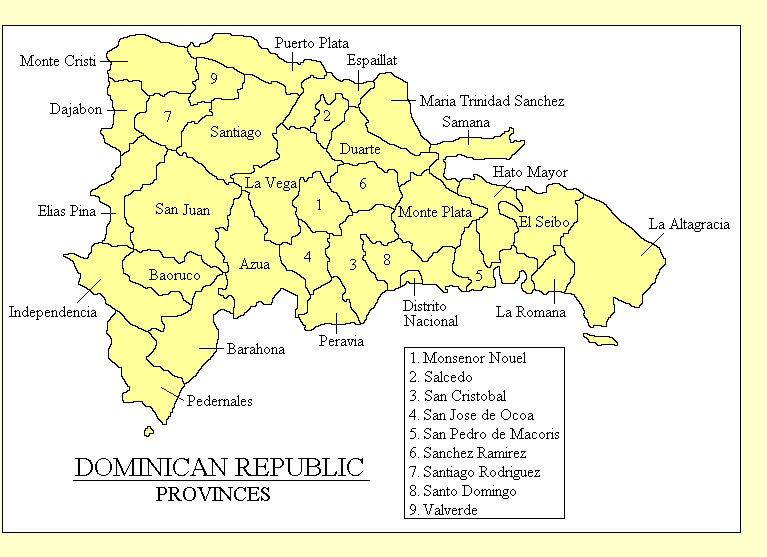

DOMINICAN REPUBLIC
• Official name: Republica Dominicana (Dominican Republic)
• Location: Caribbean
• International organisations: African, Caribbean and Pacific Group of States, Non-Aligned Movement,
Organisation of American States, United Nations, World Trade Organisation
• Borders: Haiti
• Coastline: North Atlantic Ocean, Caribbean Sea
• Land area: 48,730 Km2
• Population: 10,100,000
• Annual GDP (PPP) per capita: US$8,300 (2009 CIA estimate). World ranking: 92
• Ethnicity: 73% of the population are of mestizo (mixed European and African)
descent. 16% are of wholly European (chiefly Spanish) descent, while 11% are of
wholly African descent.
• Languages: Spanish is the official language and is universally spoken.
• Religion: Almost the entire population are at least nominal Catholic Christians.
• Form of government: Presidential democratic republic. The Dominican Republic is
divided into 29 provinces and one national capital district.

• Capital: Santo Domingo
• Constitution: The
Constitution of the Dominican Republic came into effect on 12 July 1991.
• Head of state: The President, elected by direct universal suffrage for a
four-year term.
• Head of government: The President, who appoints all ministers.
• Legislature: The Dominican Republic has a bicameral legislature, the
Congress of the Republic (Congreso de la
Republica). The Chamber of Deputies
(Camara de Diputados) has 150 members, elected for four-year terms by proportional representation from
the provinces. The Senate (Senado) has
32 members, elected for four-year terms from single-member constituencies.
• Electoral authority: The Central Election Council
conducts national elections.
• Freedom House 2009 rating: Political Rights 2, Civil Liberties 2
Political history
The island of Hispaniola, of which the Dominican Republic now forms the eastern half,
was claimed for Spain by Columbus in 1492. The Spanish colony was seized by France in
1794 but returned to Spain in 1809. In 1822 the forces of newly independent Haiti
occupied the colony, and retained it until 1844, when the Spanish colonists regained
control and founded the Dominican Republic. Through the 19th century the republic was
ruled by a series of strongmen, one of whom tried unsuccessfully to sell the country
to the United States.

Political instability led to an American occupation between 1916 and 1924. The
government was reformed under American rule and free elections were held in 1924. But in
1930 Rafael Trujillo seized power and ruled as a particularly ruthless dictator until
his assassination in 1961. With democratic government restored, the voters elected
Juan Bosch, a socialist, in 1963. Nine months later the army seized power, beginning a
period of chaos when resulted in a renewed American occupation in 1965.
In 1966 Joaquin Balaguer, a conservative, came to power after elections
which were generally regarded as rigged. He retained power until his defeat in 1978,
and was again elected between 1986 and 1996, when he was aged 90. Since 1996
the country has enjoyed stable government and free elections.
Juan Bosch's party, the Dominican Revolutionary
Party (PRD), is now a party of the moderate left. Its candidate Hipolito Mejia was elected president
in 2000, but in 2004 he was defeated by
Leonel Fernandez of the
conservative Dominican Liberation Party (PLD) (who was president
from 1996 to 2000). Fernandez was
re-elected in 2008. At the 2006 legislative elections the PLD and its allies won a majority in the
Chamber of Deputies. Balaguer's Social Christian Reformist Party (PRSC)
is now a minor Christian democratic party which supported the PRD in 2008.
Freedom House's 2009
report on the Dominican Republic
says: "The Dominican Republic is an electoral democracy. The 2008 presidential election and the 2006 legislative
elections were determined to have been free and fair... Official corruption remains a serious problem.
Fernandez, whose first term in the 1990s was marred by a scandal involving the disappearance of $100
million in government funds, made fighting corruption a central theme of his 2004 election campaign [but]
the corruption problem has not improved much during his tenure, and the Dominican Republic was ranked
102 out of 180 countries surveyed in Transparency International's 2008 Corruption Perceptions Index...
The law provides for freedom of speech and of the press, and the government generally respects those rights...
The judiciary, headed by the Supreme Court, is politicized and riddled with corruption, and the legal system
offers little recourse to those without money or influence."
Updated January 2010
|


